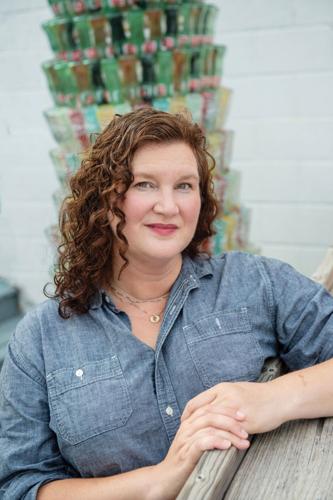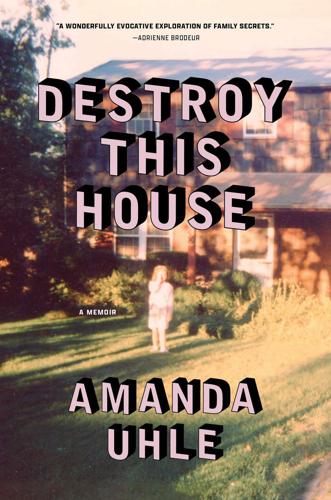
Amanda Uhle
There’s a scene in Amanda Uhle’s new memoir Destroy This House where the pre-adolescent narrator is navigating a pile of nearly empty shampoo bottles and a moldy loofah in the family’s only shower. They’ve just moved from a house with six-and-a-half baths in another city, and her hoarder mom refuses to toss bottles she brought along — even nearly empty ones. “Some had but an inch or two of product, but releasing them into the garbage bin would have meant an uncomfortable sense of closure for Mom,” Uhle writes. “You had to pick a spot in the shower and stay there.”
In a book about a childhood filled with abrupt changes, the move from a home Uhle calls the “mansion” to a 1,300-square-foot rental in a “shabby subdivision” is par for the course. So is her dad’s switch from quixotic entrepreneur to Lutheran minister. One day Stephen Long is peddling air freshener in Sweden and promising Madonna will sleep in their guest room while she works with him on a new perfume. The next he’s studying Greek so he can enter a seminary, hoping church authorities will overlook his divorce.
Though never regular churchgoers, the Longs “made a swift transition from what we were before to a full-fledged church family.”
In this unpredictable household, Amanda and her younger brother Adam try to anchor themselves in a “normal” 1980s childhood. She rides her Huffy bike and becomes an accomplished swimmer while Adam, ever “the baby,” stays inside. They both watch a lot of TV.
Like most coming-of-age memoirs, Destroy This House is about making sense of childhood experiences.

As a little girl, Amanda knows tidbits about her parents’ lives. Her dad had children from his earlier marriage but was inexplicably run out of Miami by his first wife’s family. Her mom, Sandra, was the topic of a 1973 Indianapolis Star story about her unusual career — fixing typewriters for IBM, rather than working as a typist, as many women did then. “In the shadow of Mary Tyler Moore, Mom was part career-driven Mary Richards and part homemaker Laura Petrie.”
But it’s the chaos and contradictions that are most disconcerting, particularly after they move from the East Coast to Indiana. In Indianapolis, they belong to an exclusive club but eat more often at Poe’s, a low-brow cafeteria. They lose an expensive car and drive a pickup truck that technically belongs to a relative. “I may have been blind to them, but my parents must have perceived — maybe even orchestrated — the alternating rags and riches aspects of our life. Our dinners out at Poe’s and the nights we bounced through town in the red-and-white pickup were interspersed liberally with country club evenings and international vacations.” Eventually it felt normal to switch between “picking out worms in the local live bait shop to poolside virgin piña coladas in Mexico.”
Uhle is now the executive director and publisher of McSweeney’s, and her journalism has appeared in The Washington Post, Politico and elsewhere. Perhaps reflecting the other genres she writes in, Destroy This House is freely sprinkled with pop-culture references, from The Muppet Showshe and her brother watch when they’re young to Cheers when they’re older. Those details have value, but I would have liked a more nuanced portrait of both the era and her parents, as well as a clearer sense of the author’s own emotional journey. For example, she paints vivid scenes of how embarrassed she felt by the piles of sewing fabric and canned goods that spill out of cabinets, but it’s never clear what might have made the woman with the newsworthy IBM career turn into someone who can’t throw away nearly empty shampoo bottles. Is the family’s newfound religious fervor sincere — particularly for Amanda? Or is it just another of Dad’s schemes? How did learning about her half-siblings from her father’s first marriage — and particularly that her half-brother was murdered — change her?
Near the end, Uhle asks similar questions herself. “Who were these people? What drove them? How did all of this happen in our strange lives? Why am I me?” It’s here that she enters the heart of her story.
For more local book coverage, please visit Chapter16.org, an online publication of Humanities Tennessee.
The annual event takes place Oct. 18-19 at Bicentennial Capitol Mall State Park, the Tennessee State Museum and the Tennessee State Library & Archives







